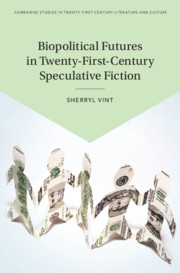Book contents
- Biopolitical Futures in Twenty-First-Century Speculative Fiction
- Cambridge Studies in Twenty-First-Century Literature and Culture
- Biopolitical Futures in Twenty-First-Century Speculative Fiction
- Copyright page
- Contents
- Acknowledgments
- Introduction
- Chapter 1 Suspending Death, Reinventing Life
- Chapter 2 The New Flesh
- Chapter 3 Capital Reproduction
- Chapter 4 Surplus Value
- Chapter 5 Life Industries
- Chapter 6 Living to Work
- Chapter 7 Life Optimized
- Chapter 8 Surplus Vitality and Posthuman Possibilities
- Conclusion
- Notes
- Bibliography
- Index
Chapter 1 - Suspending Death, Reinventing Life
The Immortal Vessel
Published online by Cambridge University Press: 16 September 2021
- Biopolitical Futures in Twenty-First-Century Speculative Fiction
- Cambridge Studies in Twenty-First-Century Literature and Culture
- Biopolitical Futures in Twenty-First-Century Speculative Fiction
- Copyright page
- Contents
- Acknowledgments
- Introduction
- Chapter 1 Suspending Death, Reinventing Life
- Chapter 2 The New Flesh
- Chapter 3 Capital Reproduction
- Chapter 4 Surplus Value
- Chapter 5 Life Industries
- Chapter 6 Living to Work
- Chapter 7 Life Optimized
- Chapter 8 Surplus Vitality and Posthuman Possibilities
- Conclusion
- Notes
- Bibliography
- Index
Summary
This chapter theorizes from the temporalities of finance capitalism, embodied in future-oriented instruments such as derivatives, and the mirror logic of cryonic suspension. Through a comparative analysis of Don DeLillo’s Zero K and Rachel Heng’s Suicide Club, both of which explore extended human lifespans, the chapter argues that these works speak to the crisis of financialized capitalism, in which many people are no longer necessary to the economy and thus appear – from its point of view – as wasted life. DeLillo examines privileged characters who attempt to live in capital’s own temporalities by cryo-preserving their physical bodies in anticipation of arriving in some transcendent and better future. Heng focuses on those whose lives are extended in perceptible time, augmented bodies in need of continual update and upgrading as much as are the technologies that have displaced other workers. Both show the inhumanism and emptiness of the life of neoliberalism’s Homo economicus, a life lived entirely to suit capital. They offer humanist culture as resistance to this trajectory, but the chapter argues these ideals are insufficient in the face of the real subsumption of life by capital.
- Type
- Chapter
- Information
- Publisher: Cambridge University PressPrint publication year: 2021

